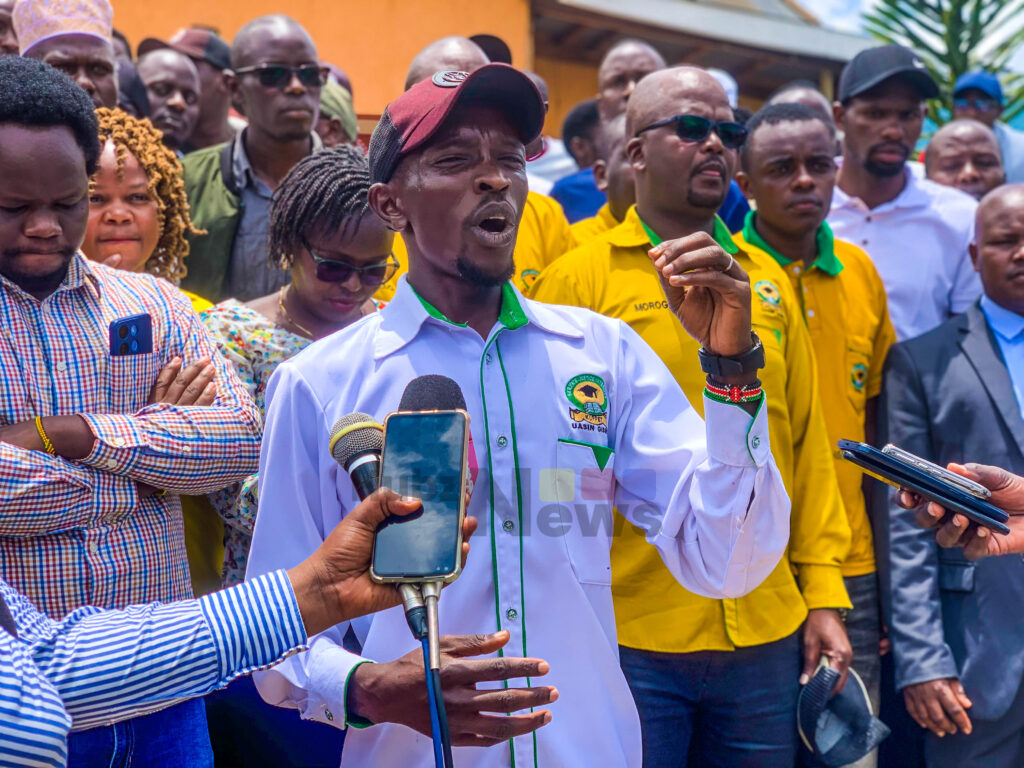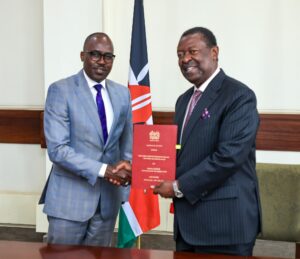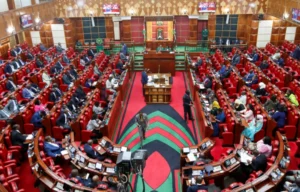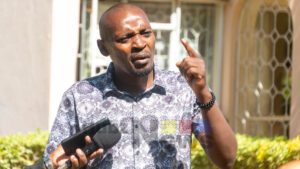Uasin Gishu JSS Teachers Reject Comprehensive School Model, Demand Autonomy and Intern Confirmation
“We are not going to negotiate anything. The JSS autonomy is something we require and it is a must,” said the KUPPET Uasin Gishu branch Chairman Sosthen Bellat

KUPPET Uasin Gishu Branch Chairman Sosthen Bellat addresses the media during a press briefing. /Image: HubzMedia
By Mercy Chelangat
Uasin Gishu County Junior Secondary School (JSS) teachers have today, September 20, 2025 made a stern call to the government requesting autonomy for junior schools, confirmation of 20,000 intern teachers by November, and proper accountability for junior students’ capitation funds. The teachers, speaking under the umbrella of the Kenya Union of Post-Primary Education Teachers (KUPPET), strongly opposed the government’s proposed “comprehensive school” organization which would incorporate JSS with primary and Early Childhood Development Education (ECDE) levels in one administrative unit.
“We are not going to negotiate anything. The JSS autonomy is something we require and it is a must,” said the KUPPET Uasin Gishu branch Chairman Sosthen Bellat during the press briefing.
Addressing members of the press in a briefing in Eldoret, the teachers clarified that their concerns stem from incompatibilities in policy, misappropriation of school funds, lack of infrastructure, and pending confirmations of intern teachers.
“We are grateful to the president for confirming us, the 46,000 teachers,” said Anita Kosgei, a JSS teacher. “We also urge our president and the government to confirm the 20,000 teachers who are serving as interns… It strengthens the quality of education in our nation.”
What’s Fueling the Outcry
The appeal follows months of escalating tensions in the Kenya’s education sector regarding the phased rollout of the Competency-Based Curriculum (CBC). CBC brought about the introduction of JSS as a transition stage between primary and senior secondary school. Since there are infrastructural limitations, the majority of the JSS classes have been held in the primary schools, and this has caused confusion regarding responsibility, resource distribution, and school administration.
The government has been considering education reforms that include discussions around integrating Junior Secondary Schools (JSS) within a unified administrative framework alongside primary and Early Childhood Development Education (ECDE) levels, commonly referred to as the “comprehensive school model.” This proposal has sparked significant criticism from teachers’ unions and educators who argue that such integration could undermine academic standards, affect teacher professionalism, and negatively impact student learning outcomes.
Teachers Want Autonomy, Not Integration
Adam Kogey, JSS History and Christian Religious Education (CRE) teacher, questioned the policy direction. He also echoed alarm at the wastefulness of utilizing capitation funds. “We never see the replication of the money given by government to what is happening in the schools.”
Staff emphasized that JSS, in policy and principle, is a secondary school level, not a continuation of primary school.
“Junior secondary school is a secondary school education level, not a primary level,” said Kennedy Tarus, a teacher of Integrated Science. “That is why the government, through TSC, helped to employ teachers of secondary school option. That status quo must remain.”
Tarus complained that science teachers were being instructed to improvise essential lab equipment in the absence of infrastructure, even though it was funded by the government: “How will I improvise a microscope? How will I improvise a lantern burner to teach about the type of flame?”
Condemnation of State House Incident
The teachers also faulted the interruption of KUPPET Secretary General Akelo Misori during a recent consultative meeting of teachers at State House. The teachers say Misori was interrupted by “green commandos” and some institution heads (HOIs), thus stopping him from reading the position of the union on JSS autonomy. “It was awkward, ‘it was uncalled for,” said Tarus. “KNUT is salivating profusely for our membership. The HOIs are defending capitation money.”
Interns Must Be Confirmed by November
Another critical request was the re-confirmation of 20,000 intern teachers who have served over a year and have not been permanently absorbed by the Teachers Service Commission (TSC). The teachers urged Parliament’s Education Committee to advance budget re-allocation to enable confirmations by November 1, 2025. “We know the government can do budgetary reallocation,” said Bellat, “We want to tell the Education Committee to re-budget very ‘fastly’ so that the teachers can be confirmed.”
‘Comprehensive Schools’ Model Rejected
The teachers thoroughly rejected the comprehensive school model, arguing that it devalues the academic differentiation among primary and secondary school teachers.
They warned that combining ECDE, primary, and JSS under one management will damage teacher morale, confuse learners, and potentially reduce educational outcomes due to poor oversight.
Co-Curricular and Capitation Challenges
The instructors also brought to attention the mismanagement of extra-curricular activities, where JSS teachers train students but are not allowed to participate in significant competitions due to management interference by the primary school administration. “There is a lot of drama happening in primary schools,” said Anthony Hosea. “You are a coach, you are training your students, then when the student advances to a certain stage, you are told the team manager will take over.”








